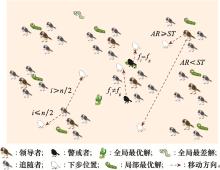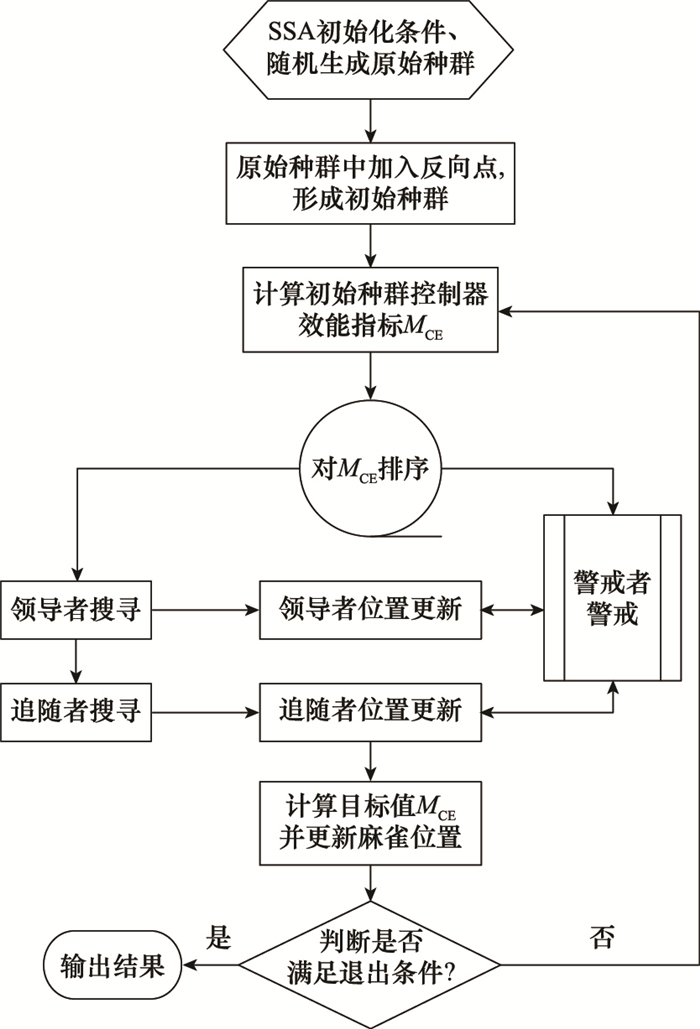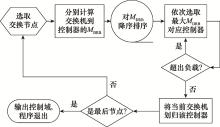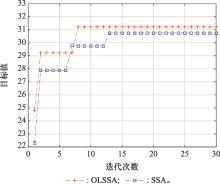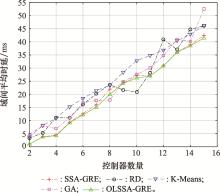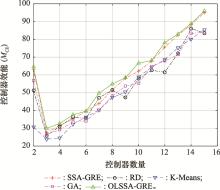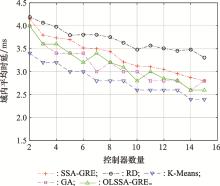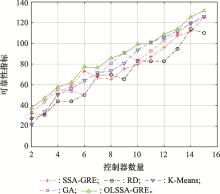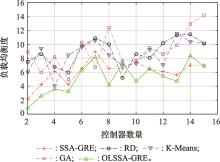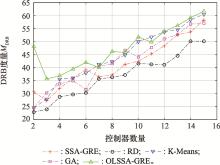Systems Engineering and Electronics ›› 2023, Vol. 45 ›› Issue (12): 4052-4063.doi: 10.12305/j.issn.1001-506X.2023.12.36
• Communications and Networks • Previous Articles
A two-stage controller balanced deployment strategy based on inter-domain efficiency priority
Wenwen ZHAO1,2,*, Xiangru MENG1, Qiaoyan KANG1, Yong YANG1
- 1. Information and Navigation College, Air Force Engineering University, Xi'an 710077, China
2. Unit 69235 of the PLA, Wusu 833000, China
-
Received:2022-01-10Online:2023-11-25Published:2023-12-05 -
Contact:Wenwen ZHAO
CLC Number:
Cite this article
Wenwen ZHAO, Xiangru MENG, Qiaoyan KANG, Yong YANG. A two-stage controller balanced deployment strategy based on inter-domain efficiency priority[J]. Systems Engineering and Electronics, 2023, 45(12): 4052-4063.
share this article
| 1 | KANG N, XING X, WANG B Z, et al. Kubernetes realizes the cloud & network cooperation based on hardware SDN controller[C]// Proc. of the 7th International Conference on Signal and Information Processing, Networking and Computers, 2020: 1052-1059. |
| 2 | AHMAD S , MIR A H . Scalability, consistency, reliability and security in SDN controllers: a survey of diverse SDN controllers[J]. Journal of Network and Systems Management, 2021, 29 (1): 2022- 2079. |
| 3 |
RANGAN R K . Trends in SD-WAN and SDN[J]. CSI Transactions on ICT, 2020, 8 (1): 21- 27.
doi: 10.1007/s40012-020-00277-5 |
| 4 | SHOZI T, MUDALI P, DLAMINI S, et al. SDN-enabled switch placement in multi-domain hybrid SD-WAN[C]//Proc. of the IEEE AFRICON, 2019. |
| 5 | 刘泽宇, 沈苏彬. 一种基于SDN的跨域服务协商方案[J]. 计算机技术与发展, 2018, 28 (9): 42- 46. |
| LIU Z Y , SHEN S B . A cross-domain service negotiation scheme based on SDN[J]. Computer Technology & Development, 2018, 28 (9): 42- 46. | |
| 6 | 杨帆, 李呈, 黄韬. OXP: 一种面向SDN移动自组网的东西向协议[J]. 电信工程技术与标准化, 2016, 29 (9): 32- 37. |
| YANG F , LI C , HUANG T . OXP: an efficient west-east protocol for SDN in ad hoc[J]. Telecommunication Engineering Technology and Standardization, 2016, 29 (9): 32- 37. | |
| 7 | BENAMRANE F , MAMOUN M B , BENAINI R . An East-West interface for distributed SDN control plane: implementation and evaluation[J]. Computers & Electrical Engineering, 2017, 57, 162- 175. |
| 8 | LIN P P , BI J , WANG Y Y . East-West bridge for SDN network peering[M]. Berlin, Heidelberg: Springer, 2013. |
| 9 | BENAMRANE F , MAMOUN M B , BENAINI R . An East-West interface for distributed SDN control plane: implementation and evaluation[J]. Computers & Electrical Engineering, 2017, 57, 162- 175. |
| 10 | YU H S, LI K Q, QI H, et al. Zebra: an East-West control framework for SDN controllers[C]//Proc. of the IEEE 44th International Conference on Parallel Processing, 2015. |
| 11 | ADEBUSUYI K , OBIKOYA G , OFUSORI T . SDNi-the new and improved hybrid software defined networking architecture for inter-domain routing[J]. International Journal of Innovative Research & Development, 2016, 5 (6): 547- 551. |
| 12 |
HELLER B , SHERWOOD R , MCKEOWN N . The controller placement problem[J]. ACM Sigcomm Computer Communication Review, 2012, 42 (4): 473- 478.
doi: 10.1145/2377677.2377767 |
| 13 | HOCK D, HARTMANN M, GEBERT S, et al. POCO-PLC enabling dynamic pareto-optimal resilient controller placement in SDN networks[C] //Proc. of the IEEE Conference on Computer Communications Workshops, 2014. |
| 14 |
LANGE S , GEBERT S , ZINNER T , et al. Heuristic appro-aches to the controller placement problem in large scale SDN networks[J]. IEEE Trans.on Network and Service Management, 2015, 12 (1): 4- 17.
doi: 10.1109/TNSM.2015.2402432 |
| 15 |
JALILI A , KESHTGARI M , AKBARI R . Optimal controller placement in large scale software defined networks based on modified NSGA-Ⅱ[J]. Applied Intelligence, 2018, 48 (9): 2809- 2823.
doi: 10.1007/s10489-017-1119-5 |
| 16 |
DAS T , GURUSAMY M . Multi-objective control plane dimensioning in hybrid SDN/legacy networks[J]. IEEE Trans.on Network and Service Management, 2021, 18 (3): 2929- 2942.
doi: 10.1109/TNSM.2021.3066847 |
| 17 |
CHAUDHARY R , KUMAR N . PARC placement availability resilient controller scheme for software-defined data centers[J]. IEEE Trans.on Vehicular Technology, 2020, 69 (8): 8985- 9001.
doi: 10.1109/TVT.2020.2999072 |
| 18 | 史久根, 谢熠君, 孙立, 等. 软件定义网络中面向时延和负载的多控制器放置策略[J]. 电子与信息学报, 2019, 41 (8): 1869- 1876. |
| SHI J G , XIE Y J , SUN L , et al. Multi-controller placement stra-tegy based on latency and load in software defined network[J]. Journal of Electronics & Information Technology, 2019, 41 (8): 1869- 1876. | |
| 19 | 史久根, 徐皓, 张径, 等. 软件定义网络中基于效率区间的负载均衡在线优化算法[J]. 电子与信息学报, 2019, 41 (3): 694- 701. |
| SHI J G , XU H , ZHANG J , et al. An efficient online algorithm for load balancing in software defined networks based on efficiency range[J]. Journal of Electronics & Information Technology, 2019, 41 (3): 694- 701. | |
| 20 | ZHANG B , WANG X W , HUANG M . Multi objective optimization controller placement problem in internet-oriented software defined network[J]. Computer Communications, 2018, 123, 24- 35. |
| 21 | 胡涛, 张建辉, 马腾, 等. SDN中基于可靠性评估的多控制器均衡部署策[J]. 通信学报, 2017, 38 (11): 188- 198. |
| HU T , ZHANG J H , MA T , et al. Multi-controller balancing deployment strategy based on reliability evaluation in SDN[J]. Journal of Communications, 2017, 38 (11): 188- 198. | |
| 22 | 胡宇翔, 王立业, 胡涛, 等. SDN中基于控制时延可靠性的控制器部署策略[J]. 通信学报, 2018, 39 (Z2): 144- 150. |
| HU Y X , WANG L Y , HU T , et al. Placement strategy of controller based on control delay reliability in SDN[J]. Journal of Communications, 2018, 39 (Z2): 144- 150. | |
| 23 | SHADI M , MOHAMMAD R , REZA M , et al. On reliability improvement of software-defined networks[J]. Computer Networks, 2018, 133, 195- 211. |
| 24 | ROS F , RUIZ P . On reliable controller placements in software defined networks[J]. Computer Communications, 2016, 77, 41- 51. |
| 25 | YAO G , BI J , LI Y L , et al. On the capacitated controller placement problem in software defined networks[J]. IEEE Communications Letters, 2014, 18 (8): 1339- 1342. |
| 26 | WANG G D, ZHAO Y X, HUANG J, et al. A K-means based network partition algorithm for controller placement in software defined networks[C]//Proc. of the IEEE International Conference on Communications, 2016: 431-436. |
| 27 | KUANG H L, QIU Y W, LI R F, et al. A hierarchical K-Means algorithm for controller placement in SDN-based WAN architecture[C]//Proc. of the IEEE International Conference on Measuring Technology & Mechatronics Automation, 2018: 263-267. |
| 28 | 黄梅根, 袁雪, 吴令令, 等. 软件定义网络中基于时延和负载的多控制器部署策略研究[J]. 电子与信息学报, 2022, 44 (1): 288- 294. |
| HUANG M G , YUAN X , WU L L , et al. Research on multi-controller deployment strategy based on latency and load in software defined network[J]. Journal of Electronics and Information Technology, 2022, 44 (1): 288- 294. | |
| 29 | PIZZUTI C . A multi-objective genetic algorithm to find communities in complex networks[J]. IEEE Trans.on Evolutionary Computation, 2012, 16 (3): 418- 430. |
| 30 | FAN Z F, YAO J, YANG X H. A multi-controller placement strategy based on delay and reliability optimization in SDN[C]// Proc. of the Wireless and Optical Communications Conference, 2019: 58-62. |
| 31 | TORKAMANI-AZAR S , JAHANSHAHI M . A new GSO based method for SDN controller placement[J]. Computer Communications, 2020, 163, 91- 108. |
| 32 | 汪民乐. 遗传算法的收敛性研究[J]. 计算技术与自动化, 2015, 34 (1): 58- 62. |
| WANG M L . Research on convergence of genetic algorithms[J]. Computing Technology and Automation, 2015, 34 (1): 58- 62. | |
| 33 | 李雅丽, 王淑琴, 陈倩茹, 等. 若干新型群智能优化算法的对比研究[J]. 计算机工程与应用, 2020, 56 (22): 1- 12. |
| LI Y L , WANG S Q , CHEN Q R , et al. Comparative study of several new swarm intelligence optimization algorithms[J]. Computer Engineering and Applications, 2020, 56 (22): 1- 12. | |
| 34 | XUE J K , SHEN B . A novel swarm intelligence optimization approach: sparrow search algorithm[J]. Systems Science & Control Engineering, 2020, 8 (1): 22- 34. |
| 35 | TIZHOOS H, HAMID R. Opposition-based learning: a new scheme for machine intelligence[C]//Proc. of the IEEE International Conference on Computational Intelligence for Modeling, Control & Automation, 2005: 695-701. |
| 36 | 赵文文, 孟相如, 康巧燕, 等. 时延和可靠性感知的多控制器均衡部署策略[J]. 空军工程大学学报(自然科学版), 2021, 22 (4): 85- 91. |
| ZHAO W W , MENG X R , KANG Q Y , et al. A delay and reliability aware multi-controller balancing deployment strategy[J]. Journal of Air Force Engineering University (Natural Science Edition), 2021, 22 (4): 85- 91. |
| [1] | Xiaogang QI, Yutong ZHOU, Lifang LIU. Evaluation of the reliability of UAV swarm for ground combat missions [J]. Systems Engineering and Electronics, 2023, 45(9): 2971-2978. |
| [2] | Feilong MAO, Yiwen JIAO, Hong MA, Jiujiang HAN, Zefu GAO, Chao LI, Dong LI. Time delay compensation method of antenna array signal based on GPU [J]. Systems Engineering and Electronics, 2023, 45(8): 2383-2394. |
| [3] | Xiaofei MIN, Jing LI, Zhaohui ZHANG. Traffic load balancing routing optimization algorithms in SDN-driven networks [J]. Systems Engineering and Electronics, 2023, 45(8): 2578-2587. |
| [4] | Ying ZENG, Yanfeng LI, Hongyi WANG, Huaming QIAN, Hongzhong HUANG. Reliability analysis of industrial robot driver combining MRGP and PSO [J]. Systems Engineering and Electronics, 2023, 45(8): 2643-2650. |
| [5] | Hongjun ZHANG, Baiqiao HUANG, Tian BAI. Adaptive mechanism construction and evaluation method of complex engineering SoS [J]. Systems Engineering and Electronics, 2023, 45(8): 2325-2331. |
| [6] | Xiangyu LI, Hongzhong HUANG, Xiaoyan XIONG. Reliability modeling of phased mission system considering shocks and phase backups [J]. Systems Engineering and Electronics, 2023, 45(7): 2280-2286. |
| [7] | Lei WU, Ju LIU, Zhichao GAO, Zheng DONG, Hongji XU. Time delay optimization scheme of industrial internet based on time sensitive software defined network [J]. Systems Engineering and Electronics, 2023, 45(6): 1836-1846. |
| [8] | Yanqiu HE, Youyuan WANG, Liping HE. Bootstrap estimation method of confidence interval for long-life product reliability based on maximum information entropy [J]. Systems Engineering and Electronics, 2023, 45(6): 1880-1892. |
| [9] | Jiang LI, Hecheng WU, Chen ZHU. Reliability assessment of long-life products based on semi-parametric degradation model [J]. Systems Engineering and Electronics, 2023, 45(6): 1893-1901. |
| [10] | Weining MA, Qiwei HU, Wenbin CAO, Xisheng JIA. Equipment selective maintenance decision optimization considering maintenance task assignment [J]. Systems Engineering and Electronics, 2023, 45(6): 1902-1910. |
| [11] | Runnan QIN, Wenming XIE, Jianjiang HUI, Xiaodong PENG, Yun LI. Task scheduling microservice strategy for space manipulation simulation [J]. Systems Engineering and Electronics, 2023, 45(5): 1391-1398. |
| [12] | Yi XIONG, Sifeng LIU, Zhigeng FANG, Shujun NAN, Jingru ZHANG, Ruirui SHAO. RMS model for availability evaluation of maritime satellite earth station [J]. Systems Engineering and Electronics, 2023, 45(5): 1570-1579. |
| [13] | Junliang LI, Huayuan ZHU, Zheng WANG, Liming WANG, Xinlei ZHANG. Reliability modeling of airborne products based on mixed Gamma distribution [J]. Systems Engineering and Electronics, 2023, 45(2): 614-620. |
| [14] | Dian ZHANG, Yunyan XING, Ping JIANG. Reliability qualification test plan based on reliability growth [J]. Systems Engineering and Electronics, 2023, 45(11): 3699-3705. |
| [15] | Jianfeng YANG, Heye XIAO, Liang LI, Junqiang BAI, Weihao DONG. Multi-level module partition method of UAV based on fuzzy clustering and expert scoring mechanism [J]. Systems Engineering and Electronics, 2022, 44(8): 2530-2539. |
| Viewed | ||||||
|
Full text |
|
|||||
|
Abstract |
|
|||||
